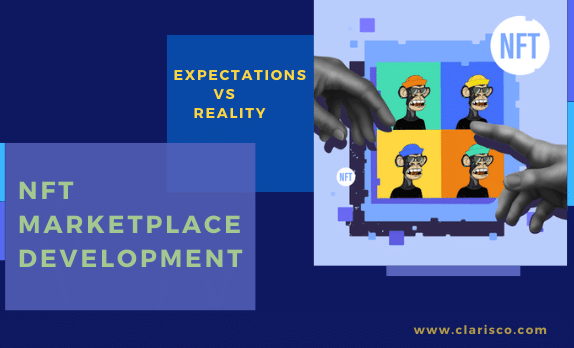NFT marketplace development: Expectations vs Reality

The NFT market is worth more than $10 billion. It was only worth a billion dollars two years ago (Yes, a billion dollars is still a huge amount, but pales in comparison to what it’s worth now). It has grown tenfold in two years. This is what analysts refer to as an emerging market, which typically indicates it has the potential to develop. And when a sector is expanding, there is typically a viable opportunity to produce money, attracting investors and critics alike.
The popularity of NFTs led to a huge demand for NFT marketplaces, and in turn, promoted the rise of NFT marketplace development. One thing to keep in mind is that most NFT marketplaces are decentralized, which means you will have very little involvement in the actual trading. Your job is to manage the website and continually update the experience for your users so that they remain engaged. The fact that you’re reading this article shows that you have some degree of knowledge about NFTs and NFT marketplace development. But for the sake of the few who are new to the world of NFT, Here’s a simple way to imagine what it’s like to run an NFT marketplace:
Imagine owning a stock trading website and the hazards associated with such a task on several fronts – You must keep a good connection with the bank, you must maintain a good relationship with your consumers, provide your clients something that your rivals do not offer, offer better discounts, and you will be held accountable if something goes wrong. These are the dangers of doing business.
But when running an NFT marketplace site, all your customers login via DeFi wallets, so they are mostly anonymous. Secondly, your website is hosted on a blockchain and all the operations are recorded there, and that immutability gives you all the assurances you need. Hence, you don’t have to juggle as many responsibilities as other website owners.
The process of developing and running an NFT marketplace
When thinking about starting an NFT marketplace, the first thing you need to worry about is the software development phase. Since the entire business model is software-based, each and every aspect of the software must be meticulously planned out and executed perfectly, balancing user-friendliness and functionality with visual aesthetics and useability. If you think you can manage all of this on your own, prepare to be disappointed. We’re not trying to be pessimistic here; But sadly, it is unrealistic to expect one person to handle design, development, and business management.
“Reality is often disappointing” – Thanos
Reality can sometimes be stranger than fiction. With the recent rise of blockchain technology, there has been a lot of hype on cryptocurrency and NFTs, which has led to some unrealistic expectations.
Let’s look at some common expectations and the reality that awaits us.
- Getting Rich Quickly
Many people who start their businesses assume that they can get rich quickly. In reality, your startup will likely take at least two or three years to become profitable. While it is still possible to shoot to success overnight, like WazirX, it’s an extremely rare sight to behold. Now that the market has matured, it is a lot harder to find a niche that is profitable without encountering stiff competition. More often than not, you’ll have to employ different tactics to divert traffic away from the competition and towards your business.
- Burnout vs. delegating
To save money, small company owners and entrepreneurs often try to do everything themselves. However, this may be unhelpful and exhausting. While It’s critical to keep an eye on your expenditures, you cannot accomplish everything on your own. Especially as a young business. Most small business owners and entrepreneurs, for example, are not marketing specialists. And hiring marketers isn’t always simple or inexpensive when you’re just starting off. Fortunately, there are several options available today to remedy this.
- Adhere to your Audience
Apple fans didn’t realize they needed the iPhone until Steve Jobs offered it to them. However, just because innovation is important in business does not mean that you can persuade an audience to adore any product.
Instead of simply assuming that “they’ll come around eventually,” A great business owner considers their target market and the kind of difficulties they confront. That is the only way to ensure that you are developing something that will resonate with the correct folks. This is where the customizability of white label scripts comes into play, letting you add features that benefit your users. As you launch your product into the market, make sure to listen to your client’s comments and pivot accordingly. Your audience will tell you what you need to do to succeed.
- Startup grind and work-life balance
People believe that company owners have plenty of time to relax and follow their interests. This is seldom the case, particularly for a new small firm. Even in a rapidly growing field such as the NFT market.
This independence is only possible if you’ve developed a profitable and sustainable business or if you’re superhuman and can handle everything at the same time. However, building a profitable and sustainable firm is difficult. Expect to work the majority of the week to assist your business to succeed in its early stages. This is not to say that you should neglect other elements of your life, such as entertainment and health. Keep in mind that you are your most valuable investment. Your business will suffer if you are not healthy. Find strategies to better manage your time and experiment with increasing your productivity.
- Instant success vs. experimentation
Many business owners fall in love with their product or service and believe that customers would automatically support them. This rarely happens.
You must make sure that the quality of your products and services remains uncompromised. That is the first step in establishing a profitable business. However, it would be advantageous if you made modifications along the road and experimented with refining your services in order to achieve a great product-market or service-market fit. Start by asking yourself the following questions:
- How can I make my NFT marketplace cater to my audience?
- How can my NFT marketplace make creators’ lives easier?
- What useful trends can I utilize for my business?
- What are people looking for these days?
- How can my business address this gap?
- What kind of people is my target audience?
Investing time in studying your target audience to understand them as individuals better will help you tremendously and allows you to fine-tune your business.
- People will not like your NFT marketplace!
This is probably one of the hardest pills to swallow. No matter how much blood, sweat, and tears you pour into your NFT marketplace, there’s always going to be someone who’s gonna hate it. The fact of the matter is that it is impossible to make everyone happy. The trick is to figure out which group to satisfy and make changes to the platform to better suit their needs. This will almost always make the other group unhappy, but you have to get used to ealing with backlash.
- Cutting costs
This is another difficult topic to address. If you’re passionate about your project, you probably want the best that money can buy; the best software, the best personnel, and so on. This is where the law of diminishing returns comes into play. For those unfamiliar with the term, the law of diminishing returns states that “as investment in a particular area increases, the rate of profit from that investment, after a certain point, cannot continue to increase if other variables remain at a constant.”
Managing funds is a vital skill, especially during the early years of running any business. So you have to figure out where to compromise and where to go all in. For example, you might be tempted to spend a huge portion of your budget on software development, since software forms the core of your business. But developing an entire NFT marketplace from scratch is a tricky and time-consuming hassle that can simply be avoided by using a cheap white label NFT marketplace script.
Conclusion
So there you have it: a fun little look into what goes into developing and running an NFT marketplace. We, Clarisco solutions, have helped many clients to develop NFT marketplaces, and this article is backed by the lessons we learned directly from our clients. We hope you enjoyed reading this article, and we wish you luck with your endeavors. Au revoir!





